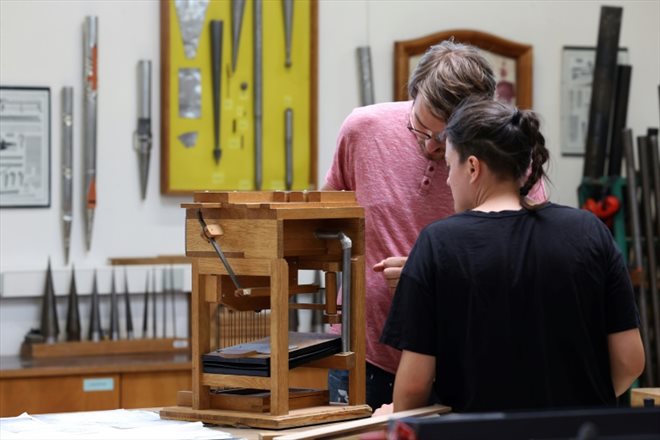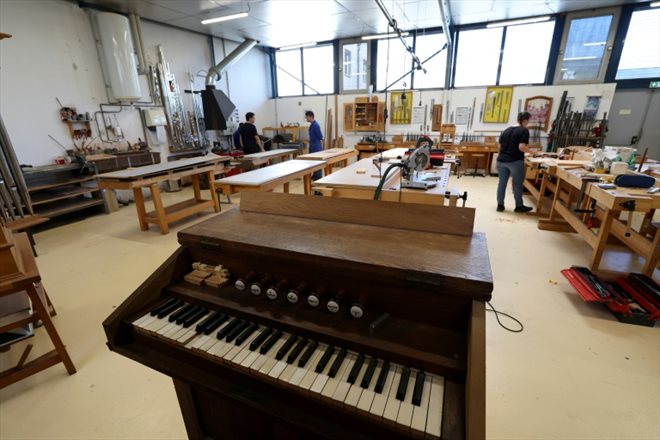Apprentices work on the model of an organ at the Organ Building Training Center in Eschau, eastern France, September 5, 2023 (AFP/FREDERICK FLORIN)
A guaranteed job, centuries-old technique and missions all over the world: organ builders are sought-after experts, but in Alsace, the only school in France which trains them struggles to attract vocations.
“When I say that I am an organ builder, people wonder if I work at La Poste,” laughs Thibaut Metz, who is training at the Organ Building Training Center in Eschau, near Strasbourg.
Like this 24-year-old boy, around fifteen students are preparing for a professional baccalaureate to learn how to build or repair organs. Already qualified after three years of study, Thibaut has just started again for two years of training in piping and is practicing pouring molten metal in the workshop where cabinetmaking and mechanics are also taught.

Apprentices work on the model of an organ at the Organ Building Training Center in Eschau, eastern France, September 5, 2023 (AFP/FREDERICK FLORIN)
A cabinetmaker by training and saxophonist for pleasure, Salomé Bonneau, 28 years old, is the only girl in her class. “It combines wood and music: it’s the perfect job for me.”
Alsace is a land of organs, with 1,250 instruments alone out of the approximately 8,000 listed in France. With its large Protestant community, the region has a number of villages with a Catholic church and a Protestant temple, which is mathematically twice as many organs.
Since 1985, Alsace has also had the only national training school for organ builders, to meet the labor needs of the hundred or so companies in the sector in France. In Europe, only Germany and Switzerland have similar training.
– Worship and culture –
“The profession of organ builder has existed since the 3rd century BC,” recalls Michaël Walther, head of the organ building department at the training center. But he suffers from ignorance: “Young people don’t know the job. Many adults tell me: ‘It’s a job I would have liked to do’, but it’s too late.”

Michael Walther (2nd from right), trainer, talks with apprentices at the Organ Building Training Center in Eschau, eastern France, September 5, 2023 (AFP/FREDERICK FLORIN )
The numbers have dwindled since the beginning of the school, founded in 1985, in particular due to the loss of religious practice: “The organ is the church and the church is religious: people do not “We don’t go there anymore. We do have a few concert halls with organs, but not enough for it to be a cultural instrument and not a religious one,” notes Mr. Walther.
In the meantime, due to lack of labor, organ manufacturing companies are struggling to meet the demand of their customers.
“We could hire three more people but we can’t find anything,” complains Guido Schumacher, boss of the factory of the same name in Eupen (Belgium), who fears that many workshops will close in the future for lack of a buyer.
Without a school in Belgium, Mr. Schumacher sends his French-speaking apprentices to train in Eschau.
– International career –
Adjoining the school, the Muhleisen company is one of the largest organ builders in France.
The factory includes a 14 meter high tower, into which an entire organ can fit. “We assemble the organ in the workshop and then we dismantle it, and we reassemble it piece by piece to its final destination,” explains David Bleuset, an employee of the company for 35 years.

A view of the workshop of the Organ Building Training Center in Eschau, eastern France, on September 5, 2023 (AFP/FREDERICK FLORIN)
Wood, tin, leather… the company manufactures the parts used in these instruments itself, with the exception of the wind tunnel. She designs the new organs she designs with software but is mainly focused on restoring old organs, such as those in the cathedrals of Amiens and Chartres, the latter in partnership with two competitors.
“French companies have too much work. We cannot respond to a call for tenders alone,” explains Mr. Bleuset.
Employees are often required to carry out long missions in France or elsewhere when it comes to restoring an instrument or installing a new one.
“We are up and down the valleys. Each time, the challenge is to adapt to the instrument, because each organ is unique,” notes Mr. Walther.

The workshop of the Organ Building Training Center in Eschau, eastern France, September 5, 2023 (AFP/FREDERICK FLORIN)
Witness to international career possibilities: Didier Grassin, current president of ISO. This native of Poitiers has worked in the United Kingdom, Canada and the United States, where he runs the Noack Organ company in Massachusetts.
“We don’t go and get our parts in China or subcontract in Guatemala: the guy who works sees his finished product,” he notes.
Despite the lack of labor, wages in the sector remain low.
But for Mr. Bleuset, it is the passion that counts. “If we have ideas of high salary, we should not do this job. What we do is quite magical.”
© 2023 AFP
Did you like this article ? Share it with your friends using the buttons below.




